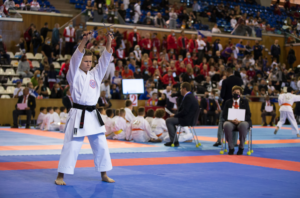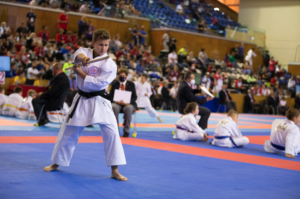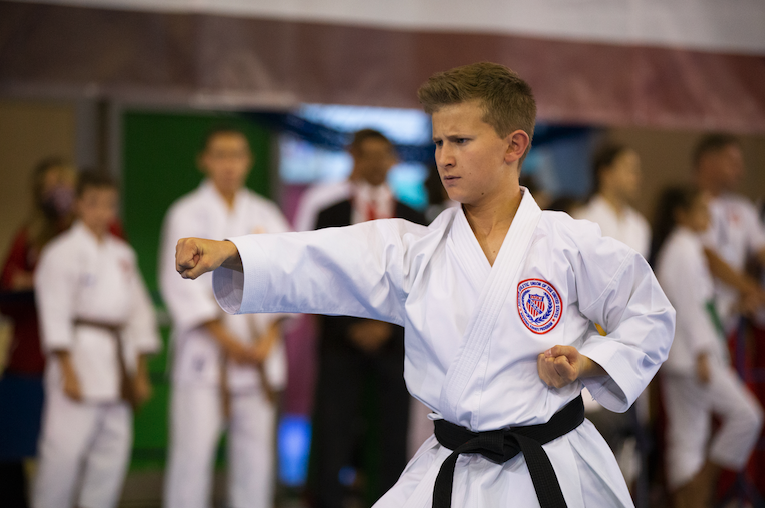Local Middle Schooler Tyler Macke Is a World Karate Champion
Photography Provided by Chris Thornberry
 Some kids seem to be born with excessive amounts of energy, and Tyler Macke was one such child.
Some kids seem to be born with excessive amounts of energy, and Tyler Macke was one such child.
“He had endless energy from the moment he woke up until the moment he went to bed,” says his father Steve.
His robust vigor made it difficult for him to focus, listen or sit still. Steve and Megan, Tyler’s mom, struggled to find disciplinary techniques that worked on their son. Desperate to focus that energy in a positive way, his parents decided to enroll him in a karate class.
“We wanted him to learn to wait to be called upon when speaking or when addressing an adult, to look the teacher in the eye and stand with his hands behind his back, and to line up in a row and stand quietly while others were doing something,” Steve says.
As it turns out, karate instruction was the best decision they ever made. It taught Tyler patience, discipline, respect and obedience. The instructor, known as the sensei, disciplines through pushups and calisthenics – a technique that Steve found helpful at home.
“Tyler often wasn’t complying because he had all this energy that was drowning out everything around him,” Steve says. “If I had him do 20 pushups or 30 jumping jacks, he could calm down and listen to what I had to say.”
When Tyler started karate, he quickly earned the nickname Fireball by his sensei.
“At 4 years old I certainly was a fireball, but now I take karate more seriously,” says Tyler, who noticed a stark difference in his focus, concentration and demeanor once he began practicing karate. “Karate has helped me in my determination to do tough things. It’s also helped with my endurance, my patience and my respect of authority figures.”
At 4 and 5 years old, karate class consisted mostly of playing games and doing exercises. At ages 6 and 7 he started earning belts and worked his way up from there. Now he’s a seventh-grader at Brownsburg East Middle School.
When it comes to karate, there are two different worlds – self-defense and tournament competition. One might assume that earning a black belt is the highest milestone that can be reached in the discipline, but those in the karate world know that karate begins once you get your black belt. Think of it like graduating from a driver education class and getting your license, enabling you to get out on the road to hone your skills.
“Year after year I kept getting new belts,” says Tyler, who tested for his black belt at age 9.
 There is a youth and adult black belt. Students are considered at youth level until age 16, at which point they can start in the adult ranks. Going from a first- to second-degree black belt is generally a two-year process. Going from second to third degree is a three-year commitment, third to fourth degree takes four years, and so on. The hanshi (the head patriarch over the entire program) at Tyler’s karate studio received his tenth-degree black belt in his 60s – proof that karate can certainly be a lifelong discipline.
There is a youth and adult black belt. Students are considered at youth level until age 16, at which point they can start in the adult ranks. Going from a first- to second-degree black belt is generally a two-year process. Going from second to third degree is a three-year commitment, third to fourth degree takes four years, and so on. The hanshi (the head patriarch over the entire program) at Tyler’s karate studio received his tenth-degree black belt in his 60s – proof that karate can certainly be a lifelong discipline.
Tyler joined the competition team at age 8, competing at local tournaments and loving it. At ages 8, 9 and 10 he went to regionals, where he qualified for nationals. He competed at nationals at ages 8, 9, 10 and 12 (he missed the competition at age 11 due to the pandemic). In 2019 he also competed at an international tournament in Hawaii.
At competitions, participants generally compete in three events including sparring (a point-scoring match with gloves), kata (a preset routine that demonstrates punching and kicking), and kobudo (kata with the addition of a tool of some sort utilized in the routine).
Tyler, who turns 13 in June, has medaled at nationals in kobudo and kata all four years he’s competed – an impressive feat as there have been some large divisions. Youth competition includes age groups and four skill groups including beginner, novice, intermediate and advanced. Tyler has competed at nationals twice at the intermediate level and twice at the advanced level. At nationals the past two years, he scored high enough in his division to be invited to join the U.S. team at the world competition. In 2020 he was set to compete in Poland, but COVID-19 hit and everything was cancelled. In June of 2021 however, he travelled to Romania as one of three 12-year-olds chosen to represent the U.S. to compete in the World Union of Karate-do Federations World Karate Championships. He came home with gold, silver and bronze medals.
Though he’s proud of his many accomplishments, Tyler’s favorite part of practicing karate are the friendships he has developed.
“I have a lot of friends at my dojos,” he says. “I feel like I fit in there.”
In the spring of 2020, when COVID-19 temporarily shut down karate studios, Tyler elected to take a break from the discipline. Little did he know how much he needed it in his life.
“In the nine months I didn’t do karate, I went back to my old self and wasn’t behaving as well or doing as well in school,” Tyler says. “We realized that the thing in my life that had changed the most was the absence of karate. I regret taking that break.”
In another few years, Tyler will likely transition into a teaching role at the karate studio.
“Karate has given him a lot up to this point and will continue to for another few years, but once he’s a teenager he can start giving back by teaching his younger teammates what he has learned,” Steve says. “That’s what this sport is really good at. It’s about lifting people up, and taking those people who have been lifted up to pass along to the next group and help lift them up as well.”
 Three years into Tyler’s karate training, Steve decided to join his son and take lessons himself. One of Tyler’s best memories is throwing a baseball in his backyard with his dad as they quizzed each other on karate history for their black-belt test. Ultimately, father and son tested for their black belt on the same day, and that’s one of Steve’s proudest moments.
Three years into Tyler’s karate training, Steve decided to join his son and take lessons himself. One of Tyler’s best memories is throwing a baseball in his backyard with his dad as they quizzed each other on karate history for their black-belt test. Ultimately, father and son tested for their black belt on the same day, and that’s one of Steve’s proudest moments.
“Having that shared accomplishment will be something I’ll always remember and cherish,” Steve says.
As for Tyler, he says he doesn’t think he would be the same person if it weren’t for karate. Steve knows that’s true. That’s why he highly recommends that anyone who has children who struggle with focus, concentration, obedience, self-confidence or fine-motor skills should consider karate.
“I’ve never heard of any family who has ever left karate saying, ‘That made my kid worse,’” he says. “They’ve always gotten something positive from it.”






